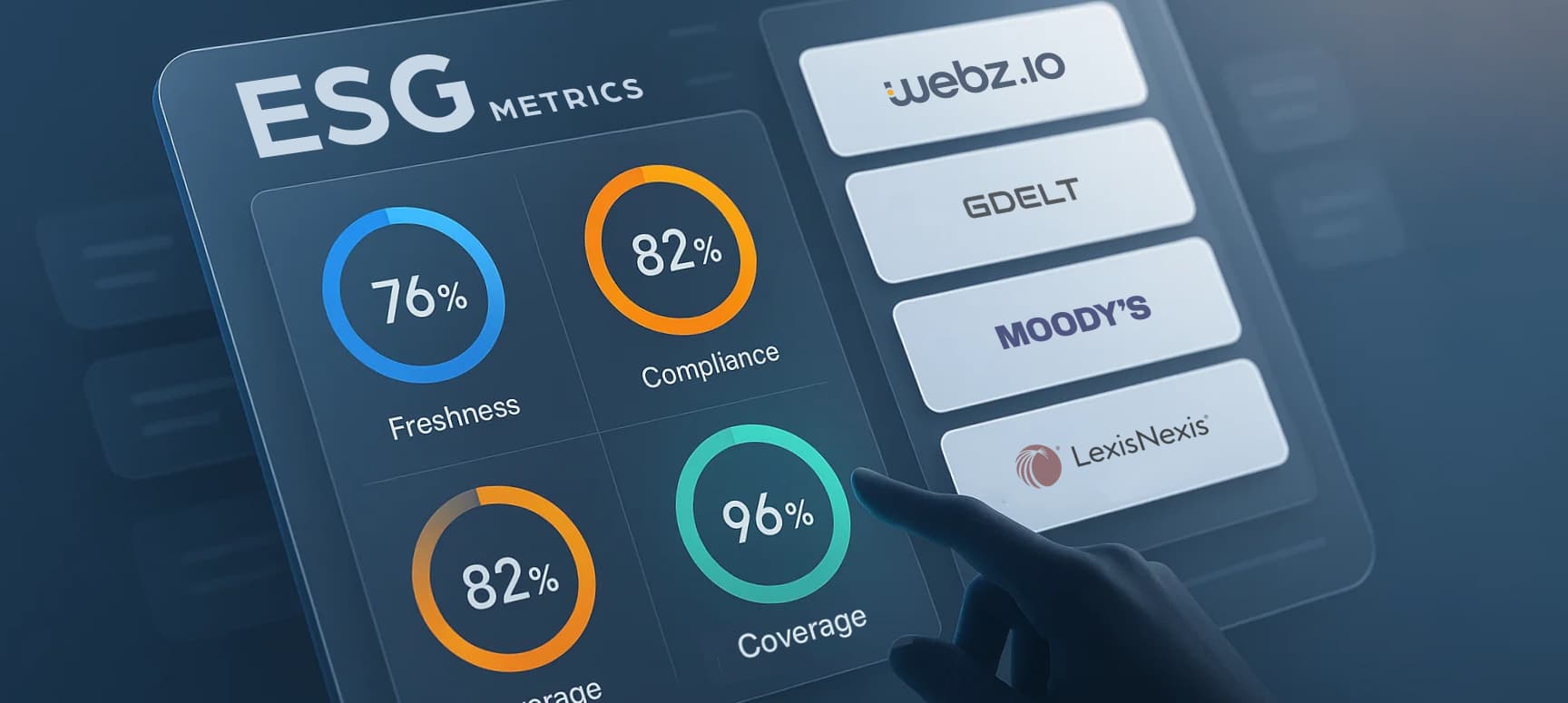How to Automate Supply Chain Risk Reports: A Guide for Developers
Do you use Python? If so, this guide will help you automate supply chain risk reports using AI Chat GPT and our News API.

Initially used quietly by hedge funds, alternative data has since gone mainstream, with real-time news, satellite imagery, and AI-tagged sentiment analysis now serving as core inputs for serious financial monitoring. These feeds also power ESG analysis, identifying carbon hotspots, labor rights controversies, and governance red flags long before sustainability reports.
Industry demand for market and alternative data has surged. WatersTechnology reported record market-data spending in 2024, while Grand View Research estimated the alternative-data market at US $11.65 billion that year, projecting a 63% CAGR through 2030. Neudata’s 2024 survey showed 95% of data buyers plan to maintain or increase alternative data budgets in 2025.
When product managers integrate alternative data APIs into financial monitoring platforms, they can deliver transformative advantages for ESG analysis, enabling capabilities that traditional data streams cannot match:
Alternative data feeds allow financial platforms to identify ESG risks before they materialize in financial statements or regulatory disclosures. By monitoring news, social media, and specialized forums, these systems detect early signals of environmental violations, labor disputes, or governance failures, often days or weeks before official announcements. This predictive capability transforms ESG monitoring from backward-looking compliance checking into forward-looking risk management .
As ESG reporting becomes increasingly standardized, it’s getting easier for investors to compare companies’ sustainability claims. However, just because a company says it’s environmentally friendly or socially responsible doesn’t mean it truly is: there can be a gap between what companies report and what they do.
Alternative data helps overcome this paradox. Instead of relying only on what companies say in their official reports, investors can look at independent sources such as local news, social media, satellite images, or employee reviews.
For example, a company’s environmental commitment might conflict with local news reports of pollution incidents, or a company can claim that it is open to diversity, but this contradicts what employees share online
Modern ESG assessment demands understanding how a company’s practices affect all stakeholders, not just shareholders. Alternative data captures the voices of employees, customers, communities, and activists, providing multidimensional perspectives on corporate behavior. Sentiment analysis across these diverse sources reveals reputational risks and opportunities invisible to traditional financial metrics.
Product managers can use alternative data to develop competitor sustainability strategies and challenges. Financial platforms deliver more sophisticated strategic intelligence by monitoring supply chain disruptions, hiring patterns, patent filings, and regulatory engagements across peer companies. Companies can use this complementary perspective to traditional competitive analysis to position themselves advantageously within sustainability frameworks.
The alternative data marketplace grows more intricate and crowded each quarter. Determining which data provider makes the most sense for your product and audience requires paying attention to the following six critical dimensions:
Geographic and sector alignment with your target markets is non-negotiable. The ideal API should deliver comprehensive coverage across your users’ investment universe. Coverage depth varies by region, with some providers offering exceptional Western coverage but lacking sources in regional languages. Data providers for ESG monitoring should capture data from trusted sources such as local language news sources, top local news in the region, and updated government regulations.
In financial markets, minutes, and often seconds, matter. The value of alternative data degrades rapidly with time. For ESG intelligence, freshness translates directly to risk management capability. A provider that delivers news of an environmental violation hours after it breaks exposes your platform’s users to reputational damage and market reactions. The latency gap between API providers can be substantial, with some offering near real-time delivery while others batch-process signals with multi-hour delays. Technical architecture, ingestion methods, and processing pipelines contribute to these critical timing differences.
Truly global financial monitoring demands diverse language capabilities and jurisdictional awareness. International ESG standards vary significantly by region, and local regulatory frameworks often drive market-relevant developments. APIs that monitor only English-language sources miss critical local insights. Top-tier providers offer coverage across dozens of languages with a contextual understanding of regional regulatory frameworks, enabling thorough ESG monitoring across a global investment portfolio.
Raw data rarely delivers actionable intelligence. The most valuable APIs provide clean, structured data with rich metadata layers, including the full text, the author, publication date, and source. Filters provide an easy way for users to separate articles based on category or entity. Next level AI processing capabilities differ across providers, with advanced systems offering entity extraction, event detection, and even predictive signals through pattern recognition.
Data rights have never been more complex. Between GDPR, CCPA, and a patchwork of international regulations, ensuring your data stream is legally compliant protects your company and your customers alike. Leading APIs document content redistribution rights, compliance certifications, and indemnification terms. For ESG monitoring, the provenance of controversial information becomes particularly important, as allegations of corporate malfeasance require proper attribution and verification.
| Provider | Coverage Fit | Freshness & Latency | Linguistic & Jurisdictional Diversity | Data Hygiene & Enrichment | Legal/Compliance Posture |
|---|---|---|---|---|---|
| Webz.io | Global (240+ countries); strong in emerging markets, energy, finance, and tech sectors. | As low as 30 seconds updates; <5-minute latency; supports push notifications. | 170+ languages; native semantic analysis for authentic multi-jurisdictional understanding. | 23 enrichment layers; advanced ESG entity recognition, sentiment, and topic classification. | Fully GDPR/CCPA compliant; transparent TOS; clear redistribution rights; regular compliance audits. |
| GDELT | Near-global; 100+ languages; excels in political/social events. | 15-minute update intervals; good for trend analysis, not real-time trading. | Broad machine translation; useful for cross-border ESG signals but less precise than native analysis. | NLP for event/entity/tone detection; strong graphs; less optimized for ESG/finance. | Academic with some commercial use; open data but redistribution may need extra review. |
| Moody’s | Global public companies, especially large corporates and finance; ESG-specific feeds. | Regular and verified updates; not real-time. | Solid in developed markets/financial centers; language support adequate but not specialized. | Rigorous quality, verification, and ESG scoring; high data structure. | Strong compliance, redistribution, and regulated entity suitability. |
| LexisNexis | 80,000+ news/legal sources; wide industry/region coverage; excels in regulation/legal risk. | Continuous updates with moderate delay for verification. | 75+ languages; strongest for legal/regulatory cross-border work. | Immaculate structured data; SmartIndexing™, but not ESG-first. | Decades of compliance experience; robust data rights and usage terms. |
| NewsAPI.org | ~50,000 sources; best in tech, business, consumer; weaker on ESG/local signals. | 15-minute intervals; easy but lacks real-time or alerts. | Major world languages; limited emerging market/regional depth. | Basic categorization/entity extraction; simple integration, extra work for ESG. | Standard API TOS; fewer redistribution and compliance certs—caution for regulated use. |
Webz.io’s News API stands out as an alternative data source for ESG monitoring, leveraging an AI-powered collection infrastructure that harvests signals from over 100 million web sources in near real-time. It comprehensively covers traditional news, blogs, forums, and the dark web, capturing mainstream narratives and emerging controversies before they are widely circulated. Crucially, Webz.io emphasizes data trustworthiness, providing access to primary sources directly from local news outlets, corporate newsrooms, and government publications. Product managers can easily filter out untrustworthy sources and select these highly reliable primary sources via intuitive filters.
Webz.io delivers global coverage across more than 240 countries and territories, with particularly powerful monitoring of emerging markets where ESG risks often first materialize. The platform captures signals across energy, manufacturing, technology, and financial sectors, the core areas where ESG considerations drive investment decisions.
With update intervals as low as 30 seconds and an average latency of under five minutes from publication to API availability, Webz.io consistently delivers market-moving information ahead of price movements. The platform’s architecture supports push notifications for critical alerts and efficient polling for regular updates.
Supporting over 170 languages with native semantic understanding rather than mere translation, Webz.io provides authentic monitoring across jurisdictions with varying regulatory frameworks. This capability proves crucial for ESG monitoring, where local standards and cultural contexts significantly impact assessment.
Webz.io’s data enrichment API applies 23 enrichment layers to raw content, including entity recognition, sentiment analysis, and topic classification specifically tuned for ESG signals. The platform automatically flags environmental incidents, labor controversies, and governance issues, eliminating noise while preserving signal integrity.
Webz.io is fully GDPR and CCPA compliant, has transparent terms of service, and provides clear redistribution rights documentation while maintaining regular compliance audits. The platform’s data collection methodologies respect robots.txt protocols and other standard web ethics guidelines.
The GDELT (Global Database of Events, Language, and Tone) Project is an academic-commercial hybrid that monitors global news media across print, broadcast, and web sources to identify patterns in world events. Its massive-scale approach to news monitoring provides unique insights into worldwide stability and social dynamics.
GDELT monitors news media in over 100 languages across nearly every country worldwide, with particular strength in political and social event monitoring. While not purpose-built for financial applications, its broad coverage makes it valuable for macro-level ESG trend analysis.
GDELT updates its database every fifteen minutes and monitors global events in near real-time. However, its processing pipeline introduces slight delays compared to dedicated financial data providers, making it better suited for trend analysis than split-second trading decisions.
With impressive language coverage and global monitoring capabilities, GDELT captures signals across diverse jurisdictions and cultures. Its machine translation capabilities, while not perfect, enable cross-linguistic pattern recognition that benefits ESG monitoring across borders.
GDELT applies sophisticated natural language processing to identify events, actors, and tones within news content. Its Global Knowledge Graph connects entities and events, though its enrichment layers aren’t optimized explicitly for financial or ESG applications.
GDELT is an academic project with commercial components. Although its open data principles provide clear terms of use, its redistribution rights framework may require product managers to undertake additional scrutiny during commercial integration.
Previously known as Moody’s Analytics, Moody’s merges traditional financial intelligence with alternative data capabilities. Moody’s comprehensive stock data API offers detailed information on public companies across global markets.
Moody’s covers public companies around the globe, particularly in financial institutions, and large corporations. Its ESG-specific feeds focus on climate risk, governance factors, and regulatory compliance issues.
Moody’s delivers updates regularly, though without the near-real-time capabilities of web-native providers. Its strength lies in carefully verified signals rather than breaking news velocity.
While offering global coverage, Moody’s demonstrates particular strength in major financial centers and developed markets. Its language capabilities are solid but less extensive than specialized web monitoring platforms.
Moody’s excels in structured data quality, with rigorous verification processes and extensive metadata. Its ESG risk scores and climate analysis provide validated insights.
Moody’s follows redistribution rights and usage terms and is suitable for regulated entities concerned about data provenance.
LexisNexis leverages its decades of legal and news aggregation experience to deliver structured alternative data for financial and risk analysis. LexisNexis’ archives combined with entity resolution capabilities provide rich historical context.
With access to over 80,000 news sources and legal databases, LexisNexis offers wide coverage across many industries and regions. Its particular strength lies in regulatory and legal risk assessment, a critical component of governance monitoring.
LexisNexis updates continuously but processes through multiple verification layers, creating moderate latency compared to web-native alternatives. This approach prioritizes accuracy over speed, making it better suited for thorough due diligence than real-time monitoring.
Supporting content in 75+ languages with particular strength in legal and regulatory frameworks across jurisdictions, LexisNexis excels in governance monitoring across borders. Its historical archives provide valuable context for evolving ESG standards.
LexisNexis provides immaculate, structured data with consistent entity resolution across sources. Its proprietary SmartIndexing Technology™ applies relevant metadata, though its classification systems weren’t designed initially for modern ESG applications.
With decades of experience in compliance-sensitive industries, LexisNexis maintains rigorous data rights management and clear usage terms. Its institutional approach provides confidence when integrating potentially sensitive information.
NewsAPI.org is a resourceful and straightforward tool for monitoring the news. It focuses more on quick access and integration than financial capabilities. The tool is known for being developer-friendly.
NewsAPI monitors approximately 50,000 news sources globally, with stronger coverage in technology, business, and consumer sectors than in specialized ESG domains. Its focus on mainstream publications limits visibility into emerging or local issues.
Product managers can benefit from fifteen-minute update intervals and straightforward API architecture with NewsAPI. The vendor delivers reasonable timeliness for general news monitoring but lacks the millisecond-level timestamps and real-time alerting capabilities required for time-sensitive applications.
Supporting content primarily in major world languages, NewsAPI shows limitations in regional coverage and local source monitoring. This focus restricts its utility for comprehensive global ESG monitoring, particularly in emerging markets.
NewsAPI provides basic categorization and entity extraction but lacks the specialized ESG tagging and sentiment analysis offered by finance-focused alternatives. Its straightforward JSON format facilitates integration but requires additional processing for sophisticated applications.
While maintaining standard API terms of service, NewsAPI offers less comprehensive documentation around redistribution rights and compliance certifications than enterprise-focused alternatives. Product managers need to take this into consideration if they are seeking APIs for more regulated financial applications.
Selecting the optimal alternative data API for ESG monitoring requires product managers to align with their company’s specific platform goals, technical architecture, and user expectations. Product managers can take the following considerations into account during their evaluation process:
Integrating alternative data APIs, financial data APIs, and market data APIs is a necessity for platforms aiming to provide comprehensive ESG insights. Integrating alternative data has shifted from competitive advantage to baseline expectation in financial monitoring platforms. As ESG considerations become increasingly central to investment decisions, the ability to deliver timely, comprehensive sustainability intelligence differentiates market-leading solutions from legacy systems.

Do you use Python? If so, this guide will help you automate supply chain risk reports using AI Chat GPT and our News API.

Use this guide to learn how to easily automate supply chain risk reports with Chat GPT and news data.

A quick guide for developers to automate mergers and acquisitions reports with Python and AI. Learn to fetch data, analyze content, and generate reports automatically.